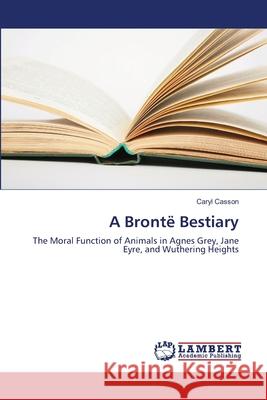A Brontë Bestiary » książka
A Brontë Bestiary
ISBN-13: 9783838351056 / Angielski / Miękka / 2010 / 92 str.
Contrary to the enduring myth that the Bronte sisters led lives of isolation, they were in fact acutely aware of contemporary events. These included important developments in human and animal welfare. In their three greatest works, each sister uses animals to comment on the morality of her characters. In Agnes Grey, the treatment of animals is a reliable compass to the devout religiosity and uncomplicated morality of good people. Although clearly a lover of animals, Anne Bronte shows her characters' animalistic tendencies and associations in a negative light. Charlotte Bronte's Jane Eyre uses animals in a more complex way. In the novel, man's similarity to animals is not portrayed as necessarily bad, but it is each main character's ability, or lack thereof, to master his animal instincts that acts as an indicator of morality. Meanwhile, in Wuthering Heights the barriers between man and animal break down, allowing Emily Bronte to call into question polite society's belief in its own superiority to other life on earth, be it human or animal."
Contrary to the enduring myth that the Brontë sisters led lives of isolation, they were in fact acutely aware of contemporary events. These included important developments in human and animal welfare. In their three greatest works, each sister uses animals to comment on the morality of her characters. In Agnes Grey, the treatment of animals is a reliable compass to the devout religiosity and uncomplicated morality of good people. Although clearly a lover of animals, Anne Brontë shows her characters animalistic tendencies and associations in a negative light. Charlotte Brontës Jane Eyre uses animals in a more complex way. In the novel, mans similarity to animals is not portrayed as necessarily bad, but it is each main characters ability, or lack thereof, to master his animal instincts that acts as an indicator of morality. Meanwhile, in Wuthering Heights the barriers between man and animal break down, allowing Emily Brontë to call into question polite societys belief in its own superiority to other life on earth, be it human or animal.











